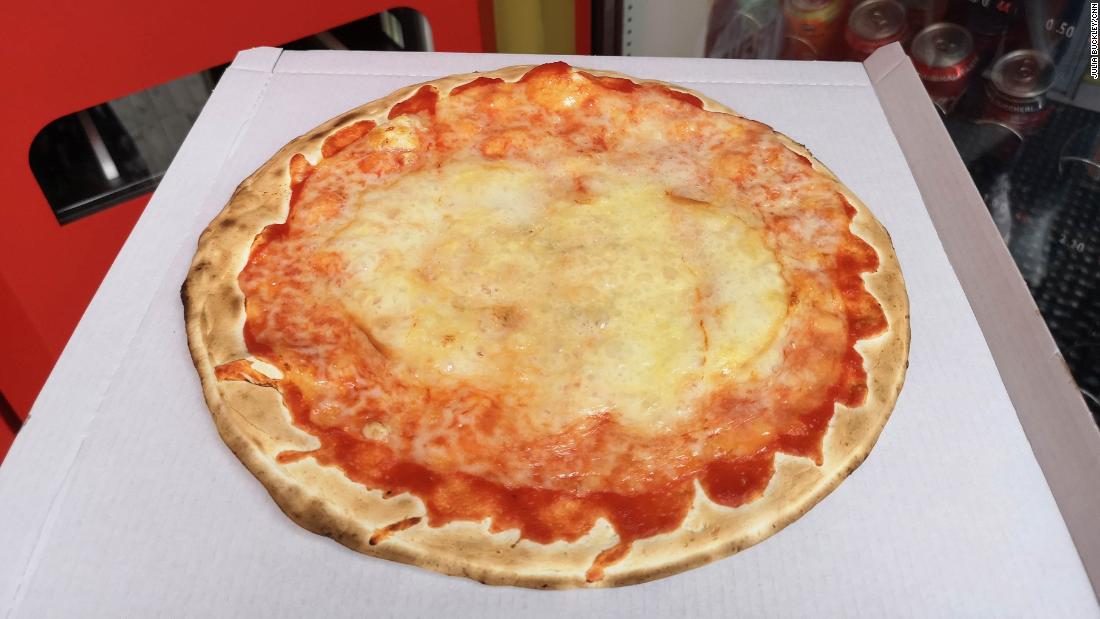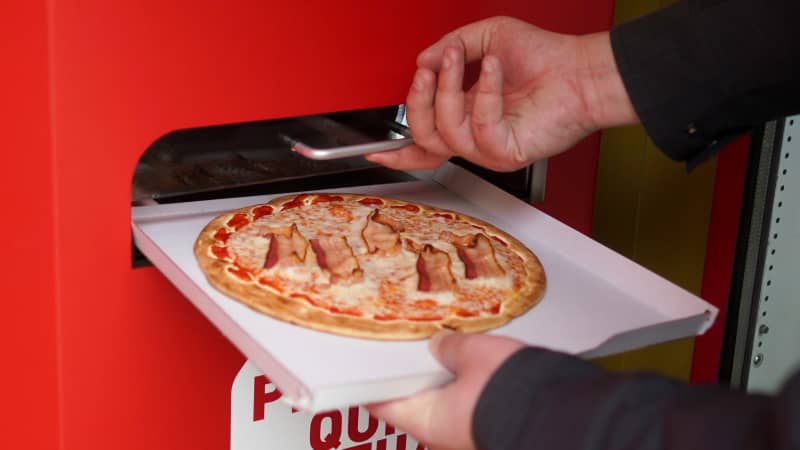(CNN) — It’s known for its ancient ruins, the seat of Catholicism and some of the world’s best pizza.
Yes, in Rome, the art of pizza is up there with the art of constructing buildings that will last for 2,000 years, and guiding one of the world’s major religions.
Compared to the original Neapolitan style, Roman pizza is thinner, flakier and crunchier, since it’s baked for a little longer. The pizzerias of Trastevere, the boho neighborhood across the River Tiber from central Rome, are lauded as some of the best places in the world to try the dish.
Now there’s another kind of Roman pizza, however — and it comes out of a vending machine.
Not for Mr. Go the weekly closures and afternoons off of regular pizzerias; his indefatigable metal “hands” are spinning and stretching dough, slopping on toppings and firing it all to a crisp 24/7.
The machine is the brainchild of entrepreneur Massimo Bucolo, a Sicilian living in Rome.
“There was a hole in the market — although Rome is an important city, there was nothing [foodwise] available through the night,” says Bucolo. “We never wanted to compete with a classic pizzeria.”
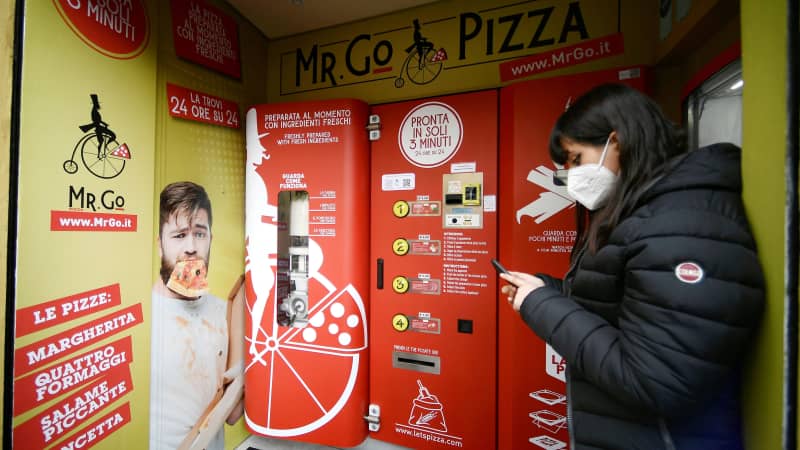
Owner Massimo Bucolo trained as a pizzaiolo before opening the vending machine.
Filippo Monteforte/AFP/Getty Images
In fact, Bucolo says it’s not even a real pizza. He calls it a “cross between a pizza and a piadina” — the pizza-sized flatbreads from the Emilia-Romagna region.
That’s because, he freely admits, true pizza — tossed by hand and seared in a wood-fired oven — doesn’t exactly lend itself to being cooked by a vending machine. Not least because the bubble effect, as the dough ripples up in the heat, risks causing topping slippage.
A piadina base would be thicker and denser than a pizza base — so what exactly does it taste like?
CNN Travel went to find out.
A ‘thing of shame’
Mr. Go sits in a residential area of Rome, around 15 minutes’ drive from the Colosseum or Pantheon, or seven from Termini train station. This is the area called Piazza Bologna, near both a hospital and a student area — so full of people pulling all-nighters (Bucolo says he scoured Rome for a suitable place). It’s a very residential area — which is why my taxi driver is extremely confused when I hop in at the Colosseum with a tourist’s sunburn and ask to be taken here.
But as soon as I tell him what I’m going for — the newest sight to see in Rome’s 2,000 years of innovation — he knows exactly where we’re heading. “I saw it on TV!” he squeals. In fact, he’s so excited that when a family member phones him, he hoots that he is taking a foreigner to the pizza vending machine.
Not that Gianni is excited in a good way. He is firmly convinced that this will be a “schifezza” — a thing of disgust, a horror, a thing of shame. He even excuses my behavior to his family member: “Oh no, she has to for work, come on,” I hear him say generously.
We arrive. Mr. Go sits just off a busy crossroads, but this is no ugly vending machine: it sits in its own little archway, with pop music blasting. (This is to create a full experience, Bucolo says later — “For those three minutes, the place is yours.”)
Along with Gianni, a born and raised Roman who is grimly fascinated by the idea of Mr. Go, I approach the machine. It’s spotless — not only is it regularly cleaned, says Bucolo, but every two or three days it’s completely dismantled, the interior is completely cleaned, and it’s sanitized for Covid-proofing. It’s also beautifully laid out, with Italian and English instructions and notes, explaining the process and showing us what to look out for.
There are four pizzas on sale: a classic margherita, quattro formaggi (with four types of cheese), spicy salami and pancetta (a type of bacon). Gianni bans me from ordering the meat, because he’s worried about refrigeration. Later, Bucolo will explain how meticulously cooled everything is backstage, but for now, we decide to plump for a quattro formaggi, adventurous yet not so susceptible to food poisoning. It’s the most expensive, at €6 ($7). (A margherita is a mere snip at €4.50/$5.30.) The machine starts whirring.
A machine-tossed pizza
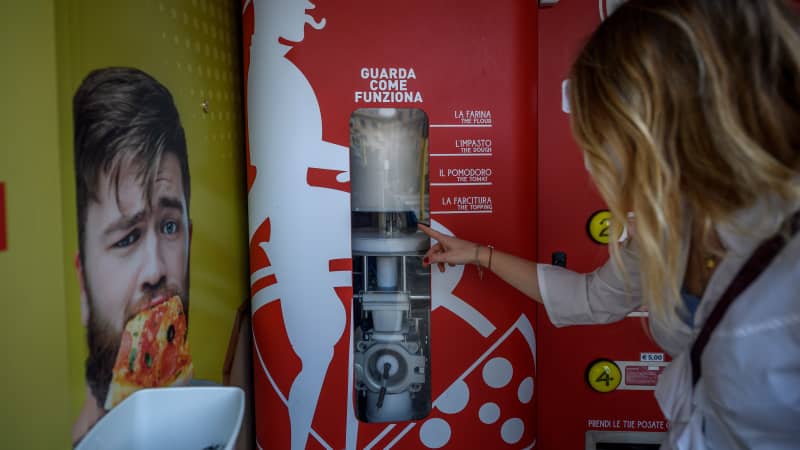
The machine has enough flour and water to make 100 pizzas at a time.
Antonio Masiello/Getty Images
First things first: it really does make the pizza from scratch. Where cheaper takeaway pizza joints across Italy often fire up the bases during quiet periods and slap on the toppings when customers come calling, Mr. Go spins together flour and water (it has enough to make 100 pizzas), presses it into a disc, and delicately adds the toppings — all in front of your eyes.
First off, we watch the flour and water being spun into dough. Bucolo says this is an intricate process — in fact, only days before our visit, he has personally adjusted the flour-water ratio in the machine, after customer feedback that the dough was too soft. (Romans like their pizza brittle, as opposed to Neapolitans, who prefer it softer.)
After the dough has been produced, all visible through a peephole, it’s kneaded into a flat disc, picked up and moved to the next stage.
Then the tomato puree is flipped on top, followed by the toppings. They’ve been chosen specifically not to cause a mess, says Bucolo — hence there’s no veg, which could flop around or fall off. Instead, the toppings for each pizza, including the mozzarella, are premixed, prearranged and stored on plastic discs, which are kept in the ‘backstage’ refrigerator.
Your chosen topping — our four cheeses, say — is then levered out on its disc and flipped onto the dough. That explains the curiously uniform blobs of salami and pancetta in the photos of the pizzas on offer.
It’s then moved onto the final stage — the ‘firing’ — where it’s levered onto what looks like a cake stand and whirled around a little oven with glowing red filaments.
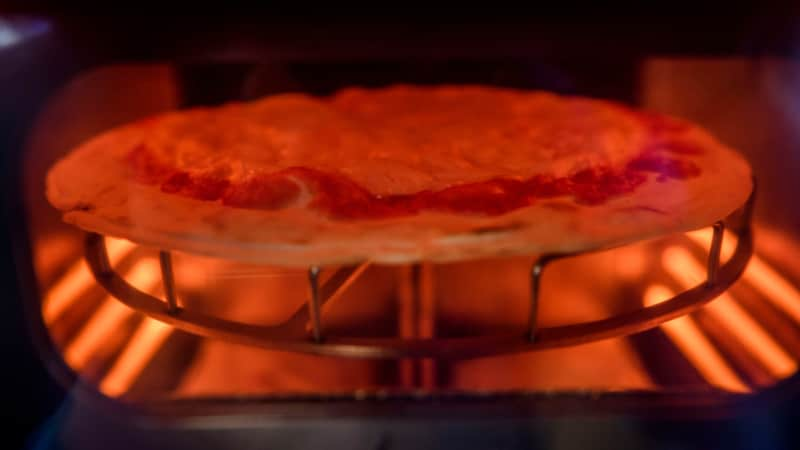
The ‘firing’ stage.
Antonio Masiello/Getty Images
The dough rises very slightly (not enough to send that topping over the edge) and the cheese begins to bubble.
Finally it’s sent (out of sight) down some kind of chute, and appears on a giant hand-shaped spatula, which lays it on its pre-warmed box.
The verdict from a Roman
It’s neat, the process has looked hygienic throughout, and it’s surprisingly appealing to look at. But how does it taste? Gianni is bursting for a slice. “Not a big one!” he insists, looking askance at the pizza, and I don’t think it’s out of politeness.
He takes a bite, and says the dough seems more like a piadina. He doesn’t seem appalled, though — in fact, it looks like he’s trying hard not to say it’s better than expected. But, he says, the price is steep. For that same $7 (or less), we could have got a “lovely big woodfired margherita” in Trastevere. In a bar, he says, you’d pay half that for a snack.
He gulps down some water and wags a finger when I offer him more. “I just hope you digest it,” he says, darkly, as I finish the rest.
His final verdict? “I think pizza should be made by pizzaioli.”
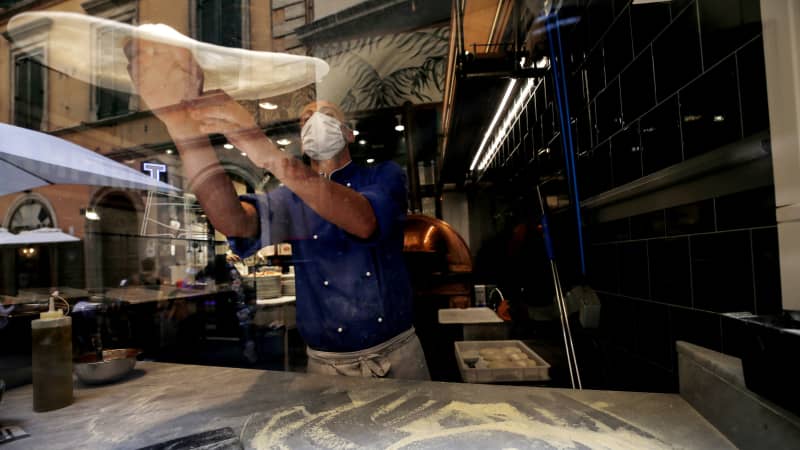
Rome is known for its dough-spinning pizzaioli.
Cecilia Fabiano/LaPresse/AP
The thing is, Bucolo is a pizzaiolo. While planning the machine, he tells me he took a proper pizza-making course, and clocked up 40 hours experience.
“This won’t take off in Rome. Go to Trastevere, and you’ll find wood-fired pizza which is also done in three minutes,” says Gianni.
But Bucolo insists that he’s not trying to compete.
“It was an idea to create something that wasn’t there: pizza at night. The products can get better, we can change them or change the machine, but it’s catering to a need.”
I can vouch for that need. Roaming Rome late at night in July, following a Euros 2020 soccer game, my friends and I were desperate to eat something — but there was nothing open. Had we known about it, Mr. Go would have been heaven-sent.
But, says Bucolo, he’ll happily take criticism. “I won’t hear criticism about the idea, but criticism [of the pizza] is fundamental. It makes us better.” Just like the criticism that made him adjust the flour-water ratio (which also, he says, will change depending on the season and humidity).
In fact, when I tell him Gianni and I thought it was a cross between a pizza and a piadina, he says, that’s exactly the point. “A pizza would dirty the insides of the machine — I worked it all out,” he says.
The future for Mr. Go, says Bucolo, is bright. For this machine, he uses only high-quality, Italian-sourced ingredients; for his next trick, he’ll be selling pre-cooked pizzas of that same quality. “Mr. Go will evolve,” he says.
But as for me? I don’t have the pizza palate of a Roman, and the piadina dough was a shock, but I’m not as unimpressed as Gianni. Plus, it’s a locally run, fun thing to do in Rome that makes a change from ancient ruins. Sure, I’d sooner get a taxi to Trastevere than to Mr. Go, but next time I’m in post-soccer need, I know where to go.
